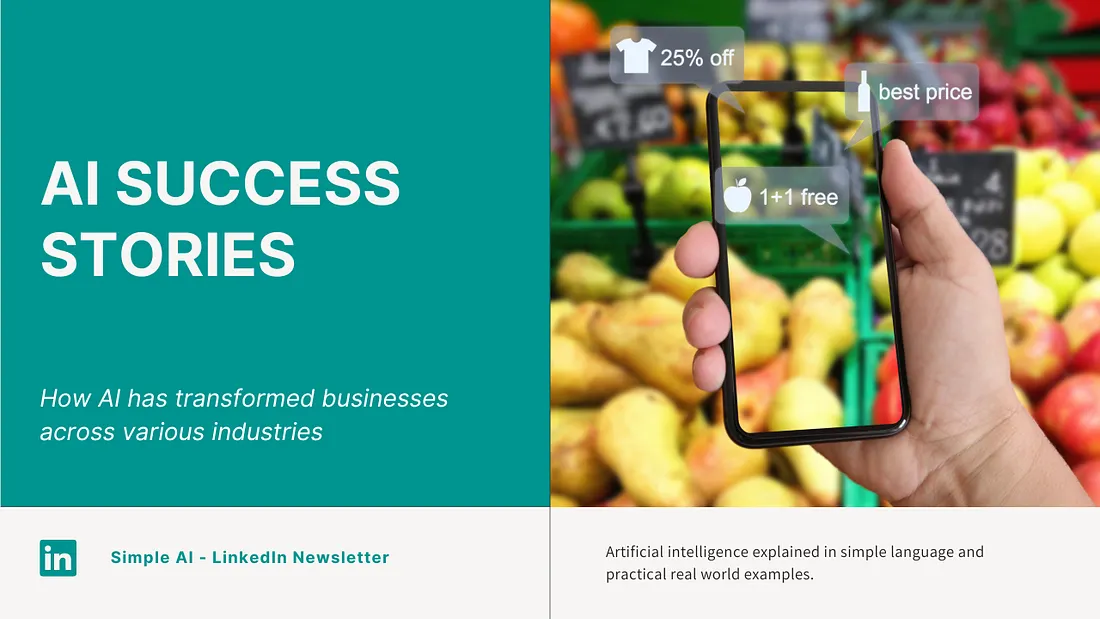Stories you may like
AI Success Stories
AI has transformed businesses across various industries, creating success stories that serve as powerful testimonies to its potential.
Today’s article is about expanding our understanding of how AI has managed to help companies work more efficiently in various areas.
I will cover 5 different industries, and finally the most eager to get started with AI-based solutions.
By the end of this short article, you should have a better overview of what AI can do for companies.
1. Retail — Personalized Shopping Experiences (a must for e-commerce companies)
One of the most notable success stories comes from the retail giant, Amazon, with its recommendation engine. This AI-driven tool analyzes customer behavior, previous purchases, and item relationships to suggest products that users are likely to buy. It’s estimated that this personalization engine drives a significant portion of Amazon’s sales, showcasing the power of AI in enhancing customer engagement and boosting revenue.
Amazon’s recommendation engine is just one example of how AI revolutionizes personalized shopping experiences. Another notable success story is Netflix, which utilizes AI to analyze user preferences and viewing habits to recommend personalized content, leading to increased user engagement and retention.
2. Healthcare — Improved Patient Care and Diagnosis (Enterprise)
In healthcare, Google DeepMind, a subsidiary of Alphabet Inc., developed an AI-powered tool that assists doctors in diagnosing eye diseases by analyzing 3D scans of the eye. This tool helps in early detection and treatment of conditions that could lead to blindness. It’s a prime example of how AI can augment professionals’ abilities, leading to better patient outcomes.
In addition to DeepMind’s efforts, IBM watsonx has made significant strides in AI-powered healthcare solutions. Their AI platform analyzes vast amounts of medical data to assist healthcare professionals in diagnosing diseases, identifying treatment options, and predicting patient outcomes, ultimately improving patient care and treatment effectiveness.
3. Finance — Fraud Detection and Risk Management (Enterprise)
In the finance sector, Mastercard utilizes AI algorithms to secure transactions and prevent fraud. Their system analyzes transaction data in real time, comparing it against the cardholder’s profile to detect anomalies that could indicate fraudulent activity. This AI application not only protects consumers but also saves millions in potential fraud losses annually.
Apart from Mastercard, PayPal is another example of a company leveraging AI for fraud detection. PayPal’s AI algorithms analyze transaction patterns, user behavior, and other data points to detect and prevent fraudulent activities, safeguarding both merchants and consumers and enhancing trust in online transactions.
4. Manufacturing — Predictive Maintenance (a must for FM companies)
Siemens employs AI in its predictive maintenance solutions, using data analytics and machine learning to predict equipment failures before they happen. This approach minimizes downtime and saves costs related to unplanned maintenance, showcasing AI’s role in enhancing operational efficiency.
While Siemens is a leader in predictive maintenance, GE also employs AI-driven solutions in manufacturing. GE’s Predix platform utilizes AI and IoT sensors to monitor equipment health in real time, predicting potential failures and optimizing maintenance schedules to minimize downtime and maximize operational efficiency.
5. Agriculture — Crop and Soil Management
In the agriculture industry, John Deere integrates AI and machine learning into their operations to optimize crop yield and reduce waste. Their AI-driven platforms analyze data from satellite images and sensors to provide farmers with insights on when to plant, water, and harvest crops, leading to more sustainable and productive farming practices.
In addition to John Deere, Climate, a subsidiary of Bayer, offers AI-driven solutions for agriculture. Their platform analyzes weather data, soil conditions, and historical crop performance to provide farmers with insights and recommendations for optimizing planting, irrigation, and harvesting practices, ultimately improving crop yields and sustainability.
6. Customer Service — AI Chatbots (easiest one to get started now)
A bot with a connected knowledge database for internal use, as well as a bot for optimized customer service, is the first product I offer my customers, as this is the first and quickest point from which you can gain clear and measurable advantages as an entrepreneur.
I use different tools for this. The choice is huge, but I recommend simply using Zapier to start with.
Many companies, including small and medium-sized enterprises, have successfully integrated AI chatbots into their customer service operations. These chatbots can handle a vast number of inquiries simultaneously, providing instant responses 24/7. This not only improves customer satisfaction but also reduces operational costs by automating routine tasks.
Apart from Zapier, Zendesk offers AI-powered chatbots and virtual assistants for customer service. These chatbots leverage natural language processing (NLP) and machine learning to understand customer inquiries, provide relevant information, and even automate simple tasks, enhancing customer satisfaction and operational efficiency for businesses of all sizes.






User's Comments
No comments there.